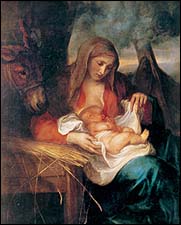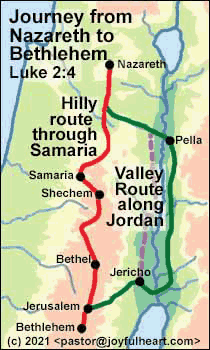
|
Old Testament
New Testament
Gospels
Acts
Paul's Letters
General Letters
Revelation
Topical Studies
Beginning the Journey (for new Christians). en Español

|
Old Testament
New Testament
Gospels
Acts
Paul's Letters
General Letters
Revelation
Topical Studies

|
Home
Bible Studies
Articles
Books
Podcasts
Search
Menu
Donate
About Us
Contact Us
FAQ
Sitemap
Day 15. Birth in Bethlehem (Luke 2:1-7)
THIRD WEEK OF ADVENT
Sunday, Third Week of Advent
 Sir Anthony Van Dyck (Flemish painter, 1599-1641), 'Madonna della Paglia (Madonna of the Straw)', Galleria Nazionale d'Arte Antica, Rome, Italy. |
(Readings and prayers for lighting the Third Advent Candle are available in Appendix 1.)
Read in the Bible: Luke 2:1-7
We've become so used to the story of Jesus' birth that we hardly consider the amazing implications of the event. Let's review them this Third Sunday of Advent.
Jesus Is Born in History (Luke 2:1-2)
First, Luke affirms that Jesus' birth is not some divine birth account, but an historical event, grounded in time and place.
"In those days Caesar Augustus issued a decree that a census should be taken of the entire Roman world. (This was the first census that took place while Quirinius was governor of Syria.)" (Luke 2:1-2)
Jesus is set in an historical context; he's neither a myth nor a legend. A myth is "a person or thing having only an imaginary or unverifiable existence."81 A legend is "a story coming down from the past; especially one popularly regarded as historical although not verifiable."82 But Jesus is born in history. He is both historical and verifiable, mentioned not only in the New Testament, but by contemporaries and early documents such as Josephus, Pliny, Tacitus, Suetonius, Bar-Serapion, Thallus, Lucian, and the Talmud.83
Here are those who were in power when Jesus was born:
Caesar Augustus is the emperor Octavian, founder of the Roman Empire, who reigned from 27 BC until AD 14, when he was succeeded by Tiberius Caesar.
Herod the Great (Matthew 2:1), the "king of the Jews, ruled Judea from 40 to 4 BC. His reputation for paranoia and ruthlessness was well deserved, having executed three of his own sons and slaughtered all the baby boys in Bethlehem (Matthew 2:16).
Quirinius is a military leader and Roman consul in central Asia Minor, and later Imperial Legate of Syria-Cilicia (AD 6 to 9).84
Jesus Is Born in David's Birthplace (Luke 2:3-4)
Now Luke explains how Jesus came to be born in Bethlehem, not in his parents' home in Nazareth.
"And everyone went to his own town to register. So Joseph also went up from the town of Nazareth in Galilee to Judea, to Bethlehem the town of David, because he belonged to the house and line of David." (Luke 2:3-4)
Bethlehem, of course, is the birthplace of David, Israel's greatest King. Nearly 1,000 years before Jesus' birth, God had promised to David through the Prophet Nathan,
"Your house and your kingdom will endure
forever before me;
your throne will be established forever." (2 Samuel 7:16; see
Day 7).
Micah had prophesied 730 years previously of Bethlehem:
"Out of you will come for me
one who will be ruler over Israel,
whose origins are from of old,
from ancient times." (Micah 5:2)
Jesus is the promised king, the Son of David. It is no accident that Joseph is "of the house and lineage of David" (Luke 2:4, KJV) and that Jesus is born in Bethlehem.
Jesus' Birth is Attended by Hardship (Luke 2:5-6)
Now Luke explains the relationship between Joseph and Mary.
"He went there to register with Mary, who was pledged to be married to him and was expecting a child. While they were there, the time came for the baby to be born." (Luke 2:5-6)
 We're not sure which route the Holy Family took from Nazareth to Bethlehem, the shorter but hilly route through Samaria, or the longer but easier route along the Jordan River. (Larger map) |
Mary and Joseph lived in Nazareth and God needed them in Bethlehem for this birth. "It just so happened..." that the Romans ordered a tax census and Joseph was required to return to his ancestral town, Bethlehem, for enrollment.85 This meant hardship for the Holy Family. The most glorious event in history is about to unfold, but for Joseph and Mary it is drudgery and hardship -- a real pain.
- Mary and Joseph live in Nazareth, four days' journey north of Bethlehem.
- Mary and Joseph are betrothed to be married; presumably, the actual marriage ceremony has not yet occurred.86
- Mary is pregnant. A journey late in pregnancy is arduous for her. But if she stays in Nazareth she has to face scandal alone. Luke puts it delicately: "... Mary, who was pledged to be married to him and was expecting a child" (Luke 2:5).
- Compounding that, it may have been winter, if second century church tradition is to be taken seriously.87
An arduous journey, a pregnant teenage mom. Who says that following God's plan is easy? Just because we face hardships and obstacles is no indication that God is absent, that we've missed his will. Sure, we face trouble. But then, we face even more trouble if we don't follow Jesus. Jesus faced obstacles, but told his disciples,
"In this world you will have trouble.
But take heart! I have overcome the world" (John 16:33).
Jesus Is Born in Humble Circumstances (Luke 2:7)
"... And she gave birth to her firstborn, a son. She wrapped him in cloths and placed him in a manger, because there was no room for them in the inn." (Luke 2:7)
The manger astounds me. Jesus isn't born in a snug home. Rather: "there was no room for them in the inn." We've romanticized the birth and swept up after the animals. But the evidence is clear: the holy Son of God is born in a stable or cave where animals are kept, and his first crib is a common cattle trough. Why?, I wonder. I don't think this was by accident or the Father's lack of provision for his Son. There's a message here.
As we'll see on Day 28, though Jesus is by very nature God (Philippians 2:6), he doesn't grasp at his prerogatives or flaunt his rights. Instead, he "made himself nothing (kenoō), taking the very nature of a servant, being made in human likeness...." (Philippians 2:7). The Greek verb kenoō means "make empty, to empty," here of divestiture of position or prestige.88 Jesus literally, "emptied himself" of all the privileges to which he is heir. He doesn't just take a low place, he takes the lowest place.
Jesus' commission is "to preach good news to the poor" (Luke 4:18; quoting Isaiah 61:1), so the Father sees that he is born among the poorest of the poor. His disciples argue about who would be greatest in the Kingdom, but Jesus stops them short:
"For even the Son of Man did not come to be
served, but to serve,
and to give his life as a ransom for many." (Mark 10:45)
 Also available in book formats: PDF, Kindle, and paperback. |
The manger represents humble service.
The message for us is clear: As Jesus' disciples, we are not to seek glory but servanthood -- serving when it is convenient and when it is not. Serving when no one understands or appreciates what we do. Christmas teaches us servanthood, God's serving -- and then ours.
Prayer
Father, thank you for telling us the gritty story of Jesus' birth in Bethlehem. Take away our desire for a problem-less existence and help us to be willing to serve you whatever comes. In Jesus' name, we pray. Amen.
Discussion Question
Q15. (Luke 2:1-7) Why is it important for us to know who
governed the area at the time of Jesus' birth? What difficulties did Mary and
Joseph face? What do you think God allowed such difficulties? Why does he allow
difficulties in our lives?
https://www.joyfulheart.com/forums/topic/2089-q15-bethlehem/
Endnotes
[81] Merriam-Webster, p. 770.
[82] Ibid., pp. 664-665.
[83] Josh McDowell, Evidence That Demands a Verdict (Campus Crusade for Christ, 1972), documents all these references and more in Chapter 5: "Jesus -- a Man of History," pp. 83-89.
[84] Josephus notes that Quirinius conducted a census in Syria (Josephus, Antiquities 18.1-3,26, referred to in Acts 5:37). The census referred to in Luke 2 isn't recorded historically, but probably took place under a kind of extraordinary command authority he possessed during his military maneuvers in Cilicia or possibly during a brief earlier stint as governor in Syria. The controversy surrounding Quirinius and this census are discussed fully in C.L. Blomberg, "Quirinius," ISBE 3:12-13; and Marshall, Luke, pp. 99-105.
[85] Usually, Romans conducted a census where residents lived, but there is a precedent for the procedure we see in Luke 2:3-5. A decree of C. Vibius Maximus, dated in AD 104, required absentees to return to their home-towns for a census in Egypt (P. Lond. 904, 20f; cited in J.M. Creed, St. Luke, London: Macmillan, 1930).
[86] "Betrothed" (ESV), "pledged to be married" (NIV), "engaged" (NRSV), "espoused" (KJV) is mnēsteuō, passive, "be betrothed, become engaged to someone" (BDAG 656). "As an act preliminary to marriage, betrothal implied a commitment almost as binding as marriage itself; its dissolution involved at least a formal divorce. The betrothed persons were referred to as 'husband and wife' and were to be completely faithful to each other" (R.K. Bower and G.L. Knapp, "Marriage, Marry," ISBE 3:263).
[87] The date of December 25 goes back to Hippolytus (AD 165-235), and Chrysostom (AD 345-407), who stated in 386 that December 25 is the correct day. Brief discussion in ISBE 1:688.
[88] Kenoō, BDAG 539, 1b.
Copyright © 2026, Ralph F. Wilson. <pastor![]() joyfulheart.com> All rights reserved. A single copy of this article is free. Do not put this on a website. See legal, copyright, and reprint information.
joyfulheart.com> All rights reserved. A single copy of this article is free. Do not put this on a website. See legal, copyright, and reprint information.

